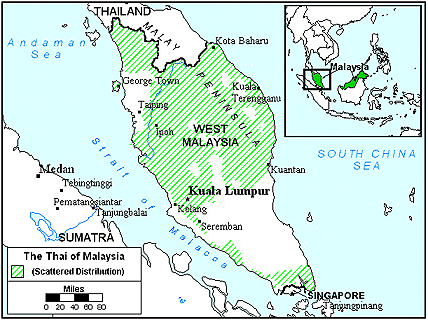Originally from China, the Thai emigrated south due to unending Chinese pressure, conquering many peoples and cultures along the way. By the tenth century, they were in southern Thailand in substantial numbers. Eventually, they moved as far south as Peninsular Malaysia where they mingled with Muslim Malay peoples. Traditionally, Thai social structure consisted of a somewhat feudal organization with distinct class divisions between nobility and commoners. Although the head of a village was a commoner, he was required to report to a nobleman who was the overseer of a district. Weakness of power on the part of the overseer led to the breakdown of this system. The nobility has now been replaced by appointed and elected officials subject to a parliament, but class distinctions are still a notable part of Thai society.
Some Thai live in northern Peninsular Malaysia bordering Thailand. Living in a tropical, mountainous region, they dwell along rivers or near roads. They speak a tonal language called Thai and are part of a larger people group known as the Tai.
The Malay culture has been strongly influenced by that of other peoples, including the Thai. For example, the city of Bangkok has played a major role in Peninsular Malaysia since the thirteenth century, and there is mutual respect between Thailand and Malaysia. Originally, the rivers were the means for political and diplomatic relations. Today, however, highways and railways maintain trade and communication between the two nations.
One can honestly say that the Malay and the Thai have their similarities, but in another way, this is a cultural ecotone, where a Muslim culture blends with a Buddhist one.
In general, the Thai are very polite, respectful, and hospitable. Children are taught from a young age to accept a code of social behavior based on respect for those of higher rank. They emphasize independence and self-reliance. Traditionally, marriages have been arranged by the parents.
The Thai, especially in northeastern Peninsular Malaysia, enjoy participating in popular puppet performances.
One cannot see a physical difference between the Malay and the Thai. They have similar, but different cuisines, both of which include much spice and coconut milk. They share the Malay language, though the Thai speak their own language at home. The biggest difference you would notice is religion.
Malaysia is a Muslim country, and some Thai Buddhists have become Muslim; these people have joined the Malay community. The vast majority of the Thai in Malaysia have remained Theravada Buddhists like the Thai in Thailand. Some remnants of their ethnic religion are still with them such as their constant attention to guardian spirits and their various ceremonies for good harvests or good weather. Buddhism is central to their identity, though they are tolerant of other people's religious views.
The Thai in Malaysia tend to live near a Buddhist temple (wat) where they join other Thai people for religious and cultural events that reinforce their identity as Thai. The Buddhist monks are instrumental in preserving this identity.
The Thai Buddhists in Malaysia need to seek God for their acceptance. They need to put their identity in Him, not in their ethnicity.
Pray for the Lord to give the Thai in Malaysia a huge rice harvest this year as a testimony of his sovereignty and lovingkindness.
Pray that Thai Buddhists will understand that Jesus Christ is for all nations, including theirs.
Pray for the Lord to thrust out workers to the Thai in Malaysia.
Pray for an unstoppable movement to Christ among the Thai in Malaysia.
Scripture Prayers for the Thai in Malaysia.
| Profile Source: Joshua Project |











